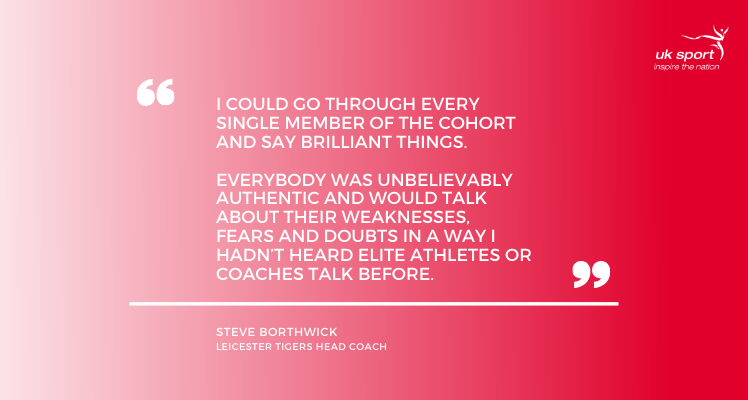UK Sport's Elite Programme aims to enhance and develop current world class coaches from across the British system, to help continue their learning and enable them to remain truly world class coaches.
In April 2019, nine of Britain's leading coaches from a variety of Olympic, Paralympic and non-Olympic sports, graduated from the rigorous three year development programme.
Following last week's conversation with British Swimming's Mel Marshall, this time around we speak to former England Rugby Forwards Coach and current Leicester Tigers Head Coach Steve Borthwick about his memories of the course and the value of learning alongside his peers from the Olympic and Paralympic sector.
What are your key takeaways from the elite coaching course?
The one over-riding takeaway was walking into the room and being surrounded by the coaches in that cohort and immediately recognising the knowledge, expertise and skill of the people there. Each time I went into the room, it was the same and just the knowledge there was incredible.
I remember a question from a workshop early on and they simply asked why we were there. I thought I knew, but the course taught me to look at things differently. I didn’t know everything and the honesty and vulnerability of everyone else taught me so much.
In reflection, what sessions jump out at you?
There’s so many to remember. The hostage negotiation session was incredible, but there’s countless experiences which made me a better coach. More than anything, it was watching and learning from the other coaches during these sessions. I learnt an incredible amount from the speakers we had, but even more from the coaches themselves.
How important was the mix of coaches from such a wide range of sports?
The mix was so important to the quality of the course. Mel (Marshall, British Swimming Coach), for example, knocked me for six each time she spoke. The passion and conviction she spoke with, mixed with her ability to deal with difficult situations was phenomenal. When she stood up in-front of the room and spoke she grabbed the room and that really struck me.
Paula (Dunn, Head Coach for British Athletics Paralympic Programme) had this remarkable empathy and I can only describe her as the sort of person who could tell me I’m dropped, and I’d still want to hug her at the end of the meeting. She has an unbelievable ability to relate to people.
I could go through every single member of the cohort and say brilliant things. Everybody was unbelievably authentic and would talk about their weaknesses, fears and doubts in a way I hadn’t heard elite athletes or coaches talk before.
If you could go back to a day or a session what would it be?
I’d say there was one moment I really remember, and it was after a session which explored where we saw our growth areas as leaders and coaches, and I was talking to Mel during the breakout. The way she questioned me made me think and made my mind go to a different level. A lot of our thought processes are quite superficial, but she made me really dig down and start questioning my thoughts and I think that was a great eye opener for me.
That’s a session from 2016 that still really resonate with me now and it’s 2020. That says a lot.

A year on from the conclusion of the course, how has it impacted you day-to-day?
We had a virtual catch-up as a cohort a few weeks ago to check-in, because that cross-sport learning and discussion is so important. The coaches taught me a lot about managing myself in a lot of ways, both physically and mentally. I think a big message I got from all the coaches was the way you portray yourself when under pressure is really important. Gareth (Southgate, England Men’s Football Manager) would stand up and speak about some of the situations he finds himself in in a changing room and you see this guy who looks absolutely unflappable, and you could just learn so much from him. Do I do it perfectly? No, absolutely not, but I’m better at it for the course.
Another thing is the different approaches to things. Before the course, everything was black and white to me. But chatting to the other coaches, listening to how they’ve dealt with situations and learning about the different ways they approach situations taught me so much. It provided me with so many new tools and gave me so many more ideas and thoughts which have really helped me grow. You have to be authentic to who you are, but I now know there’s variations to your beliefs.
What would the people you work with say the big changes have been?
I did a 360 review recently and there were definite improvements in some of the areas I wanted to work in which is a result of the course. Being a lot calmer and dealing with stress better was a big thing for me, and the ability to manage challenging situations more effectively. Having a different and more considered approach has also been a significant change.
How important was UK Sport’s role in this space?
I think there’s been real value added without question to me as a coach, but that didn’t end when the course ended. It’s opened my eyes to experience and knowledge and exposed myself to so many new experiences. We talk about enhancing players’ learning, but it’s exactly the same for the coach. The course helped me at the time, but it’s also encouraged me to keep learning and keep pushing my knowledge boundaries.
The full interview with Mel Marshall is available here.